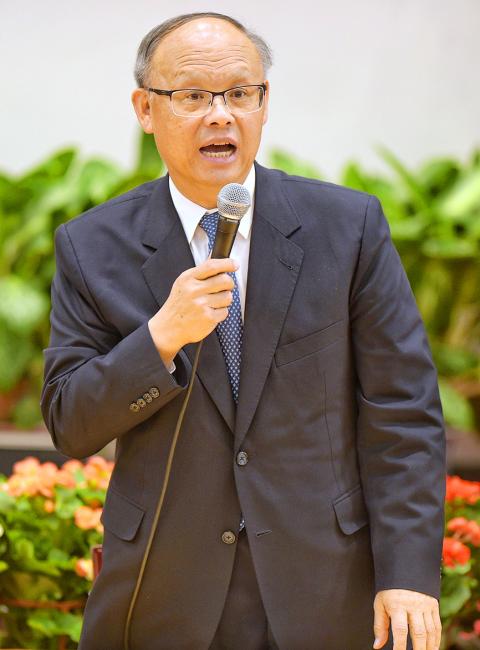The government is planning to send a high-level Ministry of Economic Affairs (MOEA) official to the US to negotiate the exemption of Taiwanese steel and aluminum exports from US tariffs, an official at Taiwan’s representative office in the US said.
The official, who spoke on condition of anonymity, said that the visit would take place before Friday, when the tariffs are to take effect.
Minister Without Portfolio John Deng (鄧振中), who doubles as head of the Executive Yuan’s Office of Trade Negotiations, was later yesterday quoted by the Central News Agency as saying that he would head the delegation to the US, which is to leave today.

Photo: Chang Chia-ming, Taipei Times
The White House on March 8 announced that US President Donald Trump signed an order under Section 232 of the Trade Expansion Act of 1962 to impose a 25 percent tariff on imported steel and a 10 percent tariff on imported aluminum.
However, the order makes it clear that nations that wish to obtain a waiver for these tariffs are allowed to come up with “satisfactory alternative means” to address trade imbalances.
For Canada and Mexico, the only nations that have been temporarily excluded from the tariffs, this means complying with US demands when renegotiating the North American Free Trade Agreement.
The day that the tariffs were announced, the ministry issued a statement saying that it would seek negotiations with the US on the matter.
The government is hoping that the ministry official will be able to convey the importance of Taiwan as a trade partner and a security ally to the US, the official said.
According to ministry data, Taiwan’s steel exports to the US last year totaled US$1.3 billion, accounting for 13.16 percent of Taiwan’s total steel exports, while its aluminum exports to the US totaled US$44 million, or 6.15 percent of its total aluminum exports.
Last year, the US was the largest buyer of Taiwanese steel products and the sixth-largest buyer of Taiwanese aluminum products.
Taiwan has reiterated its commitment to standing with the US to protect regional peace and stability, the official said.

MAKING WAVES: China’s maritime militia could become a nontraditional threat in war, clogging up shipping lanes to prevent US or Japanese intervention, a report said About 1,900 Chinese ships flying flags of convenience and fishing vessels that participated in China’s military exercises around Taiwan last month and in January last year have been listed for monitoring, Coast Guard Administration (CGA) Deputy Director-General Hsieh Ching-chin (謝慶欽) said yesterday. Following amendments to the Commercial Port Act (商港法) and the Law of Ships (船舶法) last month, the CGA can designate possible berthing areas or deny ports of call for vessels suspected of loitering around areas where undersea cables can be accessed, Oceans Affairs Council Minister Kuan Bi-ling (管碧玲) said. The list of suspected ships, originally 300, had risen to about

DAREDEVIL: Honnold said it had always been a dream of his to climb Taipei 101, while a Netflix producer said the skyscraper was ‘a real icon of this country’ US climber Alex Honnold yesterday took on Taiwan’s tallest building, becoming the first person to scale Taipei 101 without a rope, harness or safety net. Hundreds of spectators gathered at the base of the 101-story skyscraper to watch Honnold, 40, embark on his daredevil feat, which was also broadcast live on Netflix. Dressed in a red T-shirt and yellow custom-made climbing shoes, Honnold swiftly moved up the southeast face of the glass and steel building. At one point, he stepped onto a platform midway up to wave down at fans and onlookers who were taking photos. People watching from inside

Japan’s strategic alliance with the US would collapse if Tokyo were to turn away from a conflict in Taiwan, Japanese Prime Minister Sanae Takaichi said yesterday, but distanced herself from previous comments that suggested a possible military response in such an event. Takaichi expressed her latest views on a nationally broadcast TV program late on Monday, where an opposition party leader criticized her for igniting tensions with China with the earlier remarks. Ties between Japan and China have sunk to the worst level in years after Takaichi said in November that a hypothetical Chinese attack on Taiwan could bring about a Japanese

The WHO ignored early COVID-19 warnings from Taiwan, US Deputy Secretary of Health and Human Services Jim O’Neill said on Friday, as part of justification for Washington withdrawing from the global health body. US Secretary of State Marco Rubio on Thursday said that the US was pulling out of the UN agency, as it failed to fulfill its responsibilities during the COVID-19 pandemic. The WHO “ignored early COVID warnings from Taiwan in 2019 by pretending Taiwan did not exist, O’Neill wrote on X on Friday, Taiwan time. “It ignored rigorous science and promoted lockdowns.” The US will “continue international coordination on infectious